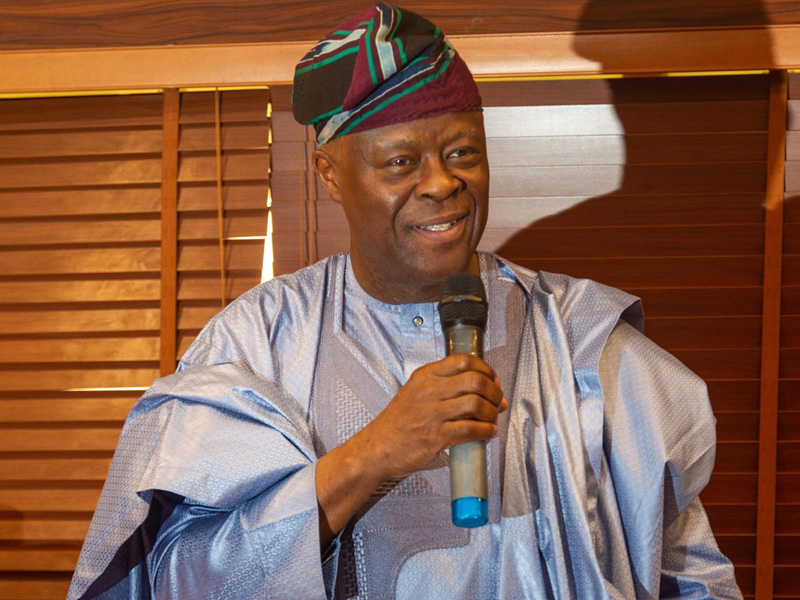
The federal government on Thursday disclosed plans to unveil the next phase of its economic reforms aimed at propelling Nigeria towards a one-trillion-dollar economy by 2030. Minister of Finance and Coordinating Minister of the Economy, Mr. Wale Edun, disclosed this on Thursday in Abuja when he provided an update on the administration’s economic reform performance at the Federal Executive Council (FEC) meeting.
Edun said the next phase of the reform agenda would focus on removing barriers to investment and enhancing productivity.
The update came as it emerged on Thursday that Nigeria’s representative in G-24, Edun, had taken over the chairmanship of the Intergovernmental Group of Twenty-Four on International Monetary Affairs and Development, otherwise known as Group of 24 (G-24). Edun took over the chairmanship of the group on November 1 for a one-year term.
Briefing FEC on the reforms during the meeting at Council Chambers of State House, Abuja, chaired by President Bola Tinubu, Edun outlined key measures underway. He said they included a comprehensive review of tariffs and import restrictions designed to boost business confidence and attract new waves of capital investment into the economy.
The minister explained, “The next phase of reforms will remove barriers holding back investors. We will review tariffs and import restrictions to stimulate productivity and investment.
“A detailed review of the federation and federal balance sheets is underway to optimise asset management for inclusive growth.
“We are improving fiscal reporting and budget realism, tightening expenditure frameworks and ensuring reforms gains are made available to all Nigerians.”
Edun added, “The Tinubu-led administration is also strengthening fiscal reporting and budget transparency, tightening expenditure frameworks, and ensuring the gains of ongoing reforms are equitably shared among all Nigerians.”
He further disclosed, “In Q2 2025, Nigeria’s GDP grew by 4.23 per cent, the highest in a decade, outside the COVID-19 rebound. Thirteen sectors recorded growth above seven per cent, up from nine in the previous quarter, showing broad-based resilience.
“The industrial sector nearly doubled its growth from 3.72 per cent to 7.45 per cent, reflecting rising productivity and investor confidence.
“Inflation eased to 18 per cent in December, while, as we know, foreign exchange reserves topped $43 billion, and our trade surplus topped N7.4 trillion. These are clear examples of macroeconomic stability.”
The minister also stated, “As the consumer spending basket published earlier this year shows, our citizens now spend, maybe, about half of their income on basic needs, food, shelter and clothing, and as compared with almost 90 per cent previously, this signals a country moving from subsistence towards productivity and, indeed, affluence.”
Edun said Nigeria’s removal from the Financial Action Task Force (FATF) grey list marked a significant milestone in strengthening the country’s financial integrity and global confidence.
He emphasised that a major takeaway from the meeting was the urgent need to mobilise domestic resources and channel greater investments towards infrastructure development and job-rich economic growth.
He added, “Hugely successful $2.35 billion Eurobond issuance, in which the order book peaked at over $13 billion, is a testament to continued investor confidence in our country and our reform agenda and Mr. President’s leadership. Despite the political headwinds which we are all aware of, the market shrugged off those political considerations and focused on the economic fundamentals of Nigeria.
“We remain committed to your vision of a N1 trillion economy by 2030, but to achieve this, we must accelerate output to seven per cent growth by 2027, not just as an economic target, but as a moral imperative to end poverty.
“Critical to attaining this growth trajectory will be attracting the necessary investment into our economy. With public investment at only five percent of GDP, we must urgently develop investment-ready projects across so many sectors that will crowd in large-scale, domestic and external capital, direct investment in the economy by Nigerians as well as by foreigners.”
Responding to Edun’s presentation, Tinubu said the Eurobond oversubscription, despite political anxieties, underlined global faith in Nigeria’s fundamentals.
He stated, “Despite the political headwinds and fears, our partners have continued to engage with confidence.”
Thereafter, Secretary to the Government of the Federation (SGF), Senator George Akume, announced to FEC the passing of former minister and senator, Solomon Ewuga, describing him as an accomplished leader dedicated to national development.
Ewuga, who served as Deputy Governor of Nasarawa State in 1999, before becoming Minister of State for the Federal Capital Territory, later represented Nasarawa North in Senate. He died on September 23, in Egypt at age 70.
Council members observed a minute’s silence in his honour.
Akume also informed the council of the death of former Chief of Staff, Major-General Mohammed Abdullahi (rtd), who served under President Olusegun Obasanjo and was former Military Governor of Benue-Plateau State as well as pioneer Director-General of the Nigerian Security Organisation (NSO).
The council again observed a minute’s silence.
“May their souls rest in perfect peace,” the SGF said.
Meanwhile, Nigeria assumed the chairmanship of G-24.
The Group of 24 was established in 1971 as a chapter of the Group of 77, designed to help coordinate the positions of developing countries on international monetary and development finance issues, as well as to ensure that their interests are adequately represented.
G24 comprises many emerging economies in Africa, Asia, and Latin America.
From the African continent are Algeria, Congo, Cote d’Ivoire, Egypt, Ethiopia, Gabon, Ghana, Kenya, Morocco, Nigeria, and South Africa. Asian members include India, Iran, Lebanon, Pakistan, Philippines, Sri Lanka, and Syria.
Latin American countries in the group are Argentina, Brazil, Colombia, Ecuador, Guatemala, Mexico, Peru, Trinidad and Tobago, Venezuela.
In an address he presented to members of the group on assumption of office, a copy of which was obtained by THISDAY on Thursday, Edun expressed appreciation to his immediate predecessor and Minister of Treasury of Argentina, Mr. Luis Caputo, for his exemplary leadership and stewardship.
He said, “We extend our sincere appreciation to Mr. Luis Caputo, Minister of Treasury of Argentina, for his exemplary leadership and stewardship.
“His tenure has significantly strengthened the G-24’s voice and relevance.
“We look forward to working closely with Pakistan and Ecuador as Vice-Chairs of the G-24 Bureau in the coming year.
“The global economy today faces unprecedented challenges—geoeconomic fragmentation, climate shifts, technological disruption, and a retreat in development financing.”
Edun stated, “Over a quarter of emerging and developing economies (EMDEs) have lost access to international capital markets, and more than half of low-income countries are either in or approaching debt distress.
“The estimated annual financing gap to achieve the Sustainable Development Goals (SDGs) stands at a staggering $4 to $5 trillion, underscoring the urgent need to reform the current global financial system.
The 2025 Annual Meetings underscored the urgency of addressing the global demographic shift.”
He added, “With approximately 1.2 billion young people expected to enter the labor force over the next 10 to 15 years—competing for only 400 million jobs—the stakes are high. “This demographic trend presents both a formidable challenge and a transformative opportunity.
“In this context, structural transformation—anchored in macroeconomic stability, economic diversification, private sector-led growth, domestic resource mobilisation, and strategic investment in human capital and digital infrastructure—remains the most viable path to resilience and job-rich growth.”
The minister said, “In today’s dynamic and uncertain global landscape, the mandate of the G-24 is more critical than ever. The organisation’s role in supporting the economic policies of its member countries must be amplified.
“EMDEs (Emerging and Developing Economies) possess a diverse array of policy instruments within their domestic contexts, and it is imperative to leverage these through effective structural reforms and strategic partnerships that promote inclusive and sustainable development.”
Under Nigeria’s chairmanship of G-24, Edun stated, “The central theme guiding our work will be, ‘Optimising Resource Development for Inclusive, Job-Rich Economic Transformation.’”
According to him, the theme encompasses all forms of resources—human, financial, physical, and natural—that are essential for sustainable economic progress.
He said, “We will foster substantive dialogue and action on a comprehensive agenda aimed at dismantling structural barriers to resource mobilisation and unlocking pathways to inclusive growth.
“This builds on the solid foundation laid by Argentina’s leadership.”
The minister stated that with the support of other member countries, Nigeria’s chairmanship would prioritise five strategic areas, including reforming the global financial architecture.
Edun stated, “Our goal is a fairer, more inclusive system strengthening the Global Financial Safety Net at the IMF, expanding concessional financing through the MDBs, advancing quota and governance reforms, enhancing regional development banks, and modernising payment systems to support local currency trade and digital transactions.”
He said Nigeria’s chairmanship would focus on enhancing domestic resource mobilisation and international tax cooperation.
The minister stressed, “We aim to deepen G-24 engagement on the global tax agenda. This includes supporting global tax initiatives within the OECD and UN frameworks, promoting transparency and progressive taxation, tackling illicit financial flows, and reforming domestic tax systems to expand fiscal space.”
According to him, another area of focus would be mobilising innovative finance for development, to bridge persistent financing gaps.
Edun said, “We will promote innovative MDB financing models that reward reform-minded countries, and support instruments such as blended finance, green bonds, and sustainability-linked debt swaps to align financial flows with development goals.”
Edun listed the strengthening of regional integration, value-added manufacturing, and advancing climate finance and just energy transitions as other strategic areas of focus.
He stated, “We will champion regional economic integration to boost competitiveness and job creation. By boosting competitiveness, facilitating investment in value-added manufacturing, and promoting South—South cooperation, we aim to unlock shared prosperity and accelerate digital innovation across regions.
“Nigeria will advocate for a transition that reflects the realities of energy-deficient and resource-rich nations, promote resilient infrastructure, and encourage sustained commitment to climate targets—especially as global energy demand rises with Al-driven technologies.
“Nigeria is committed to deepening the G-24’s influence in global financial governance, amplifying the voice of EMDEs, and ensuring that structural transformation delivers real progress for our people.”
Deji Elumoye and Ndubuisi Francis



